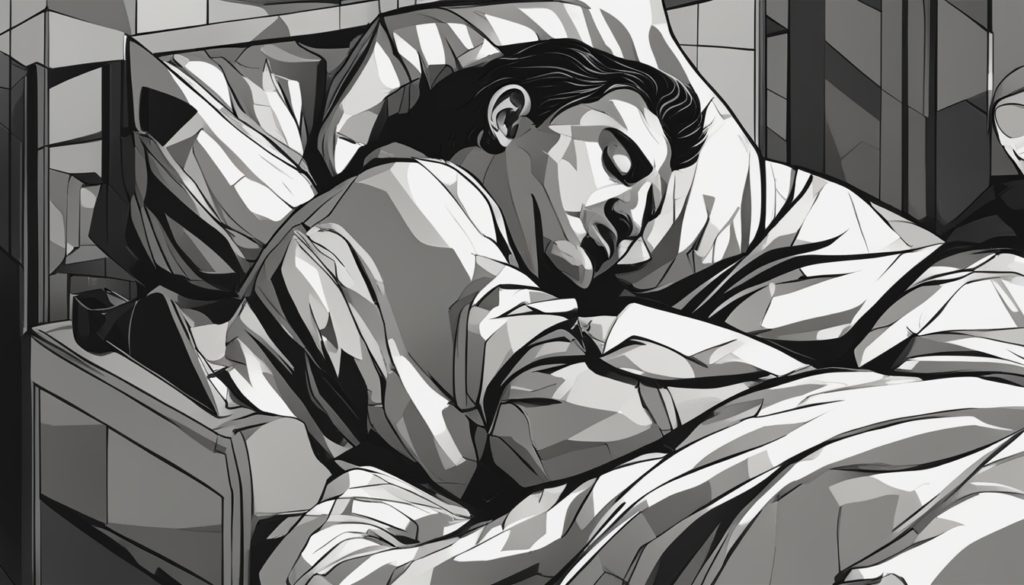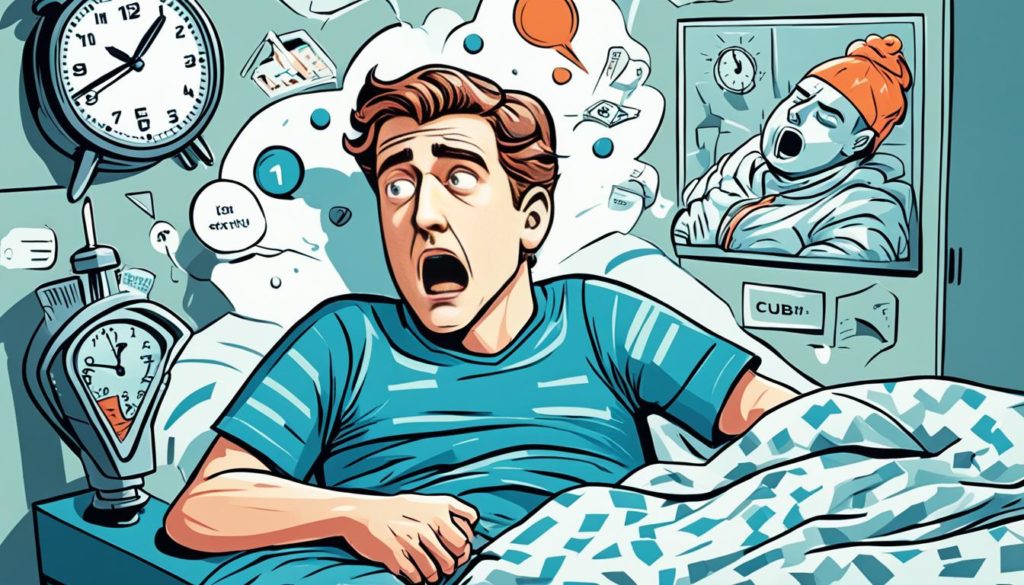Did you know about 75% of those with type 2 diabetes have trouble sleeping? This fact shows a big link between type 2 diabetes and how well we sleep. Nowadays, many people have sleep issues due to today’s fast life. Things like changing sleep schedules because of work or social activities are making it worse.
Eve Van Cauter, PhD, points out bad sleep can make glucose tolerance and insulin sensitivity worse. This makes managing diabetes harder. Sleep problems like insomnia and sleep apnea are common in diabetics. They make controlling blood sugar and staying healthy tougher.
Key Takeaways
- Approximately 75% of individuals with type 2 diabetes experience sleep disturbances.
- Modern lifestyle choices contribute to inadequate and irregular sleep patterns.
- Insufficient sleep negatively impacts glucose tolerance and insulin sensitivity.
- Common sleep disorders in diabetics include insomnia and obstructive sleep apnea (OSA).
- Improving sleep quality is essential for effective diabetes management.
The Connection Between Type 2 Diabetes and Sleep
It’s vital to understand how type 2 diabetes and sleep affect each other. Many studies highlight that good sleep helps manage blood sugar and keeps your metabolism healthy.
Insulin Resistance and Sleep Problems
When your body resists insulin, it can lead to type 2 diabetes. Not sleeping well can make insulin resistance worse. This creates a hard cycle for managing diabetes. Lack of sleep changes important hormone levels, affecting how your body uses glucose.
Impact on Glucose Metabolism
Sleep issues can disrupt how your body handles glucose. Not sleeping enough, or having poor sleep patterns, can lead to high blood sugar. It’s key to have good sleep for controlling diabetes and preventing its serious complications.

Common Sleep Disorders in Diabetics
People with type 2 diabetes often struggle with sleep problems like sleep apnea, restless legs syndrome, and insomnia. These issues not only make it hard to sleep but also put extra stress on the body. They make it harder to manage blood sugar and insulin resistance.
This summary outlines sleep disorders common among diabetics:
| Sleep Disorder | Description | Impact on Diabetes |
|---|---|---|
| Obstructive Sleep Apnea (OSA) | Repeated episodes of partial or complete obstruction of the airway during sleep | Increases insulin resistance, worsens blood sugar control |
| Restless Legs Syndrome | An uncontrollable urge to move legs, typically at night | Leads to sleep deprivation, adversely affecting glucose levels |
| Insomnia | Difficulty falling or staying asleep | Alters hormones affecting glucose metabolism |
Causes of Sleep Problems in Diabetics
Many people with diabetes struggle to get a good night’s sleep. Sleep problems are common due to several factors. These issues can affect their health and diabetes care.

Obstructive Sleep Apnea (OSA)
Obstructive sleep apnea (OSA) is often seen in people with diabetes. It happens when the airway is blocked during sleep. This causes poor sleep because of frequent awakenings. Treating OSA is crucial for people with diabetes to sleep better.
Peripheral Neuropathy
Peripheral neuropathy is typical for those with diabetes. It damages nerves. This leads to pain or numbness in limbs. Because of this pain, sleeping well becomes hard.
Restless Legs Syndrome
Restless legs syndrome causes a need to move the legs. It gets worse when you’re still, like at night. This makes falling and staying asleep tough for diabetics.
Hypoglycemia and Hyperglycemia
Changes in blood sugar levels disturb sleep in diabetics. Low blood sugar can cause night sweats and confusion. These can wake you up. High blood sugar leads to needing the bathroom at night and thirst. Both make good sleep hard to come by.
Impact of Sleep Deprivation on Diabetes Management
Sleep deprivation makes managing diabetes harder. It doesn’t just mess up your sleep patterns. It also messes with how insulin and growth hormone work. These are important for keeping blood sugar levels right. Let’s look at how not getting enough sleep affects people with type 2 diabetes.
Effects on Insulin Sensitivity
Sleep loss hurts insulin sensitivity. When you don’t sleep well, your body fights against insulin. This makes controlling blood sugar levels hard. Because of this, the pancreas has to work overtime. It makes more insulin. Over time, this can wear out the pancreas and make diabetes symptoms worse.
Growth Hormone Disruption
Lack of sleep also messes with growth hormone release. This usually happens during deep sleep. Growth hormone is important. It helps break down fat and build muscle. When you don’t sleep enough, it causes more belly fat and less muscle. This is bad for managing diabetes and your health in general.
| Factors | Effects | Resulting Issues |
|---|---|---|
| Increased Insulin Resistance | High Blood Glucose Levels | Difficulty Managing Diabetes |
| Disrupted Growth Hormone Release | More Abdominal Fat, Less Muscle Mass | Negative Impact on Body Composition |
How Sleep Disorders Worsen Type 2 Diabetes
Sleep disorders greatly harm people with type 2 diabetes, leading to more health issues. Not getting enough good sleep affects glycemic control. This makes controlling diabetes harder.
Deterioration of Glycemic Control
Sleep disorders like obstructive sleep apnea (OSA) and insomnia harm glycemic control. Bad sleep means the body can’t manage glucose well. This worsens type 2 diabetes complications. People with these sleep issues face more blood sugar swings than those who sleep well.
Increased Hunger and Appetite
Not sleeping enough causes more hunger and appetites, a tough challenge for those with type 2 diabetes. Poor sleep upsets the balance of ghrelin and leptin, hormones that control hunger. This leads to weight gain. Weight gain then makes sleep disorders like OSA worse, creating a cycle that makes it hard to manage diabetes.
| Impact | Consequence |
|---|---|
| Insufficient Sleep | Increased appetite and weight gain |
| Impaired Glycemic Control | Higher risk of type 2 diabetes complications |
| Weight Gain | Exacerbated sleep disorders like OSA |
Managing Sleep Problems in Type 2 Diabetics
Getting a good night’s sleep is key for those with type 2 diabetes. It helps keep their blood sugar stable and their health in check. They must tackle sleep issues through medical help and changes in lifestyle.
Screening and Diagnosis
Starting with a thorough check-up is crucial. Diabetics often need a sleep study to find problems like sleep apnea. They also talk to sleep experts for the best care.
Treatment Options
Different sleep problems need different treatments. For sleep apnea, a CPAP machine is common. For other issues, doctors may suggest medicine or therapy. Things like CBT and relaxing before bed can help with insomnia too.
Lifestyle Adjustments
Lifestyle changes can make a big difference in sleep quality. Going to bed at the same time each night, cutting back on caffeine, and making a cozy bedroom are important. Adding mindfulness and exercise can also lead to better sleep.
“Improving sleep hygiene is a critical step for individuals managing diabetes and sleep problems. Small adjustments in daily routines can lead to significant improvements in sleep quality.”
Here’s a quick look at different treatments:
| Condition | Treatment | Effectiveness |
|---|---|---|
| OSA | CPAP | High |
| Peripheral Neuropathy | Medications | Moderate to High |
| Primary Insomnia | CBT, Relaxation Techniques | High |
Tips for Improving Sleep for Individuals with Type 2 Diabetes
For those with type 2 diabetes, managing sleep is key. Poor sleep can really mess up blood sugar control. To help, here are ways to make your sleep better:
- Adopt a consistent sleep schedule by going to bed and waking up at the same time every day, even on weekends, to help regulate your body’s internal clock.
- Create a relaxing bedtime routine to signal your body that it is time to wind down. This can include activities such as reading a book, taking a warm bath, or practicing meditation.
- Ensure your sleep environment is conducive to rest by keeping the room quiet, dark, and comfortable. Consider using blackout curtains, earplugs, or a white noise machine if necessary.
- Avoid stimulants such as caffeine and nicotine close to bedtime. These substances can interfere with your ability to fall asleep and stay asleep.
Regular physical activity also helps with sleep, especially for diabetes. But don’t exercise right before bed, as it can make sleeping harder.
Managing blood sugar levels well also aids in better sleep. This means avoiding high or low blood sugar at night. Eat meals consistently and check your blood sugar often to keep it steady.
By making these changes to your daily life and where you sleep, you can sleep better and control your diabetes more effectively. Here’s a quick guide with tips for better sleep with diabetes:
| Strategy | Details |
|---|---|
| Consistent Sleep Schedule | Go to bed and wake up at the same time daily |
| Relaxing Bedtime Routine | Read, take a bath, or meditate before bed |
| Conducive Sleep Environment | Quiet, dark, and comfortable room |
| Avoid Stimulants | No caffeine or nicotine close to bedtime |
| Regular Physical Activity | Exercise regularly, but not before bed |
| Manage Blood Sugar Levels | Monitor and maintain balance to avoid nighttime fluctuations |
Following these sleep tips can make a big difference in your health and happiness.
The Role of Healthcare Professionals in Addressing Sleep Issues
Healthcare professionals are key in identifying and handling sleep problems in those with type 2 diabetes. They should include thorough sleep checks during regular visits to better manage diabetes. This approach is vital for good health management.
Importance of Patient History
Examining patient history is a critical step for healthcare workers in sleep assessment. This step spots risk factors like erratic work hours, unhealthy lifestyle choices, and existing health issues. Understanding a patient’s sleep habits helps doctors pinpoint and address sleep troubles effectively. They can then create a successful treatment plan.
Recommendations for Sleep Hygiene
Advising on sleep hygiene is another essential task for healthcare professionals. They should advise patients to keep a consistent sleep schedule, cut down on caffeine, and avoid screens before bedtime. Adopting these habits can enhance sleep quality and help in better managing diabetes.
“Recognizing the interplay between sleep and diabetes is essential for effective management of both conditions,” says Dr. Elizabeth Klerman, a renowned sleep specialist.
Gathering detailed patient sleep histories and offering advice on sleep hygiene allows patients to take charge of their health. These actions greatly improve their quality of life.
The Bidirectional Relationship Between Sleep and Type 2 Diabetes
Sleep and type 2 diabetes affect each other in important ways. Each condition can make the other worse. Studies show that not sleeping enough and having type 2 diabetes are linked. This is because of issues like insulin resistance and changes in hormones.
When people don’t get enough sleep, it can make it hard to control blood sugar. This is because their body’s insulin doesn’t work as well. On the other hand, having type 2 diabetes can cause sleep problems. Symptoms such as needing to urinate often, nerve pain, and discomfort can interrupt sleep.
These interruptions in sleep can make diabetes harder to manage. This can start a cycle of not sleeping well and diabetes getting worse. To learn more about this, check out this study.
To deal with this two-way relationship, a full health plan is key. It’s crucial to have regular sleep for better blood sugar control and life quality for those with diabetes. Knowing how sleep affects diabetes is vital. Good sleep habits are a big part of managing diabetes. Focusing on both can improve health and break the cycle of poor sleep and diabetes.
FAQ
How are type 2 diabetes and sleep related?
Poor sleep can make insulin resistance worse and complicate diabetes control. Obstructive sleep apnea (OSA) and insomnia are common in diabetics. These issues make controlling blood sugar harder.
Can irregular sleep patterns affect glucose metabolism?
Yes, not sleeping well or on a regular schedule can lower glucose tolerance. This makes the risk of type 2 diabetes go up.
What are the common sleep disorders in individuals with type 2 diabetes?
Diabetics often face sleep disorders like obstructive sleep apnea and insomnia. Restless Legs Syndrome and peripheral neuropathy also disrupt sleep. These issues can make controlling blood sugar harder.
What causes sleep problems in diabetics?
Diabetics may struggle to sleep because of several factors. These include obstructive sleep apnea, nerve pain, and Restless Legs Syndrome. Blood sugar highs and lows also disturb sleep.
How does sleep deprivation impact diabetes management?
Not getting enough sleep makes managing diabetes harder. It can cause less insulin sensitivity and disturb growth hormone patterns. This leads to more belly fat and muscle loss.
Can sleep disorders worsen type 2 diabetes?
Yes, sleep issues can make blood sugar control worse. They can increase hunger and lead to weight gain. This makes complications from diabetes more likely.
How are sleep problems in type 2 diabetics managed?
Managing sleep issues involves spotting them early and treating them. Treatments may include CPAP for sleep apnea or meds for nerve pain and restless legs. Making good sleep habits and a sleep-friendly setting are crucial, too.
What tips can help improve sleep for individuals with type 2 diabetes?
To sleep better, keep a regular sleep time and start a calming bedtime routine. Make sure your sleeping space is quiet and comfy. Avoid caffeine late in the day and keep your blood sugar steady.
What role do healthcare professionals play in addressing sleep issues in diabetics?
Doctors should ask about sleep during check-ups and look out for sleep problems. They should advise on good sleep habits to help manage diabetes better.
How does the bidirectional relationship between sleep and type 2 diabetes affect patients?
Bad sleep can lead to diabetes by increasing insulin resistance. Diabetes can also make sleeping hard, with symptoms like needing to pee at night or nerve pain. Fixing sleep problems helps control blood sugar and improves life for people with diabetes.


